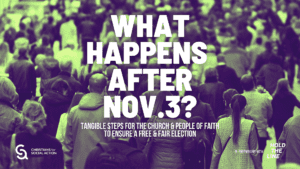
Our faith shouldn’t be co-opted by partisan politics. Our hope shouldn’t replace wisdom and prudence.
The United States of America is a country created through genocide and built by slaves. Sacrificing American lives for financial gain has been military policy for the last seven decades. Our prisons have become a billion-dollar industry. The inflated price of medicine prioritizes profits for pharmaceutical companies while the sick struggle to afford healthcare. We probably shouldn’t be surprised when our nation seems to value the economy more than the health of its own citizens. We are what we’ve always been.
We must have faith. But the Christian faith should never be based on lies, delusion, or false hope. When Christians were posting on social media that COVID-19 was a liberal hoax, an overblown leftist media campaign, or a possible attack from North Korea, we weren’t providing hope—we were promoting partisan values while simultaneously fueling a pandemic. Many Christians STILL aren’t taking the threat seriously.
A notable pastor named Shawn Bolz broadcasted on social media (Feb. 28, 2020) “The Lord showed me The end of the Coronavirus…the tide is turning now!” and “The exaggerated fear based tactics of both the enemy and several media outlets for political reasons is coming to an end.”
Jerry Falwall Jr., referring to COVID-19 in an interview with Fox and Friends (March 13, 2020), stated that “Impeachment didn’t work, and the Mueller report didn’t work, and Article 25 didn’t work, and so maybe now this is their next attempt to get Trump.” He went on: “The owner of a restaurant asked me last night, he said, ‘Do you remember the North Korean leader promised a Christmas present for America, back in December?’ Could it be they got together with China, and this is that present?’”
This type of rhetoric reflects the social media narratives of too many Christians across the United States, many of whom also villainized asylum-seekers as being hardened criminals, fear-mongered about refugees being terrorists, berated immigrants as a drain on the economy, and were so worried about people from other countries that they supported banning, blocking, and deporting them from the United States.
Dismissing the warnings of COVID-19 as hyperbole while posting Bible verses alongside mantras like “God is in control” and “Fear is from the devil” may provide comfort, but this tactic is spiritualizing hope into self-delusion.
Proverbs 22:3 says that “The prudent sees danger and hides himself, but the simple go on and suffer for it.” Proverbs 15:2 states “The tongue of the wise commends knowledge, but the mouths of fools pour out folly.” Hope should never be a form of escapism or minimization. Hope shouldn’t replace wisdom and prudence.
When political opinions become idolized and spirituality reflects partisan agendas rather than the life of Jesus, faith becomes a platform for political beliefs instead of a life-giving source of neighborly love.
When political opinions become idolized and spirituality reflects partisan agendas rather than the life of Jesus, faith becomes a platform for political beliefs instead of a life-giving source of neighborly love. Christians who are cavalier about the dangers of COVID-19 are too often the same people who are also afraid of immigrants, refugees, Muslims, LGBTQ+ individuals, liberals, and public schools. Bold proclamations about hope, not having fear, and trusting in God seem only to pertain to the coronavirus. (And too often, these public proclamations of trust in God’s sovereignty parallel a fanatical defense of gun rights. Just in case God’s power isn’t quite enough?)
Our faith shouldn’t be co-opted by partisan politics, and it should always be truthful. Christianity should never pit scientific fact against spiritual faith—they’re not meant to be mutually exclusive. But when people of faith disregard facts, the consequences can be dire. What is the value of a doctor’s lifetime of research in the face of our political opinions? Can a scientist’s years of expertise and peer-reviewed analysis compete with the rebuttal of a Twitter influencer with hundreds of thousands of followers? Can bland statistics about the spread of a virus survive an onslaught of viral political memes?
A health organization’s warnings can be shrugged off as “fake news.” The World Health Organization, the Centers for Disease Control, and the National Institutes of Health are rendered only as reliable as the political pundits who dispute them over cable news outlets, podcasts, and personal blogs. Primary sources of information are filtered through our partisan sources and eventually spewed out and dissected according to their specific agendas. These platforms include our preferred news sources, social platforms, and religious institutions.
The Christian faith should never deny truth, provide false narratives, or pretend things aren’t as bad as they really are. It shouldn’t negate common sense or supplant wisdom. Romans 12:12 says, “Rejoice in hope, be patient in tribulation, be constant in prayer.” The tribulation is still there. Hope doesn’t make it go away. Hope and tribulation coexist.
Faith is a great virtue. Hope is a great virtue. And love is the greatest virtue of all. 1 Corinthians 13:13 declares, “So now faith, hope, and love abide, these three; but the greatest of these is love.” The most important thing to do, whether we’re afraid or not, hopeful or not, faithful or not, is love our neighbor. Do unto others as you would have them do unto you.
The most important thing to do, whether we’re afraid or not, hopeful or not, faithful or not, is love our neighbor.
This is an important distinction to make, because too many American Christians have hoped without being loving. We’ve put our hope in military might. We’ve put our hope in the economy. We’ve put our hope in political platforms. But time and again, this hope came at the expense of others. The military kills people. The economy impoverishes people. The political platforms oppress people. And they all will continue to do so.
As Christians, we should re-prioritize our faith and put our hope in the love of Jesus: a person who healed others, cared for others, and loved others. Superficial hope isn’t the answer the world needs right now. Instead, our world needs the practical, sacrificial, humble, peaceful, generous, gracious, and very real love of Christ. God help us.
 Stephen Mattson is the author of The Great Reckoning: Surviving a Christianity That Looks Nothing Like Christ.
Stephen Mattson is the author of The Great Reckoning: Surviving a Christianity That Looks Nothing Like Christ.


